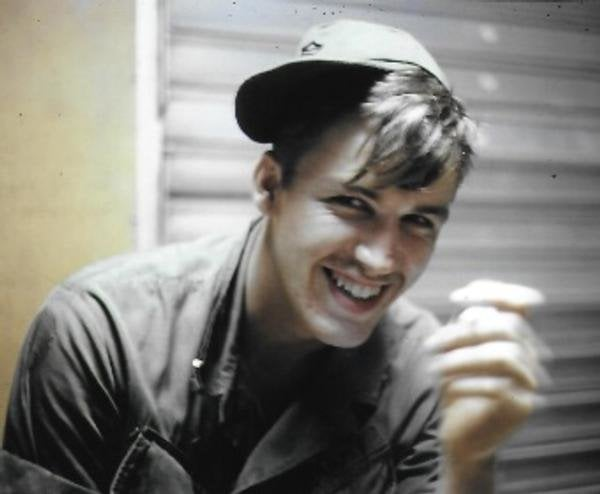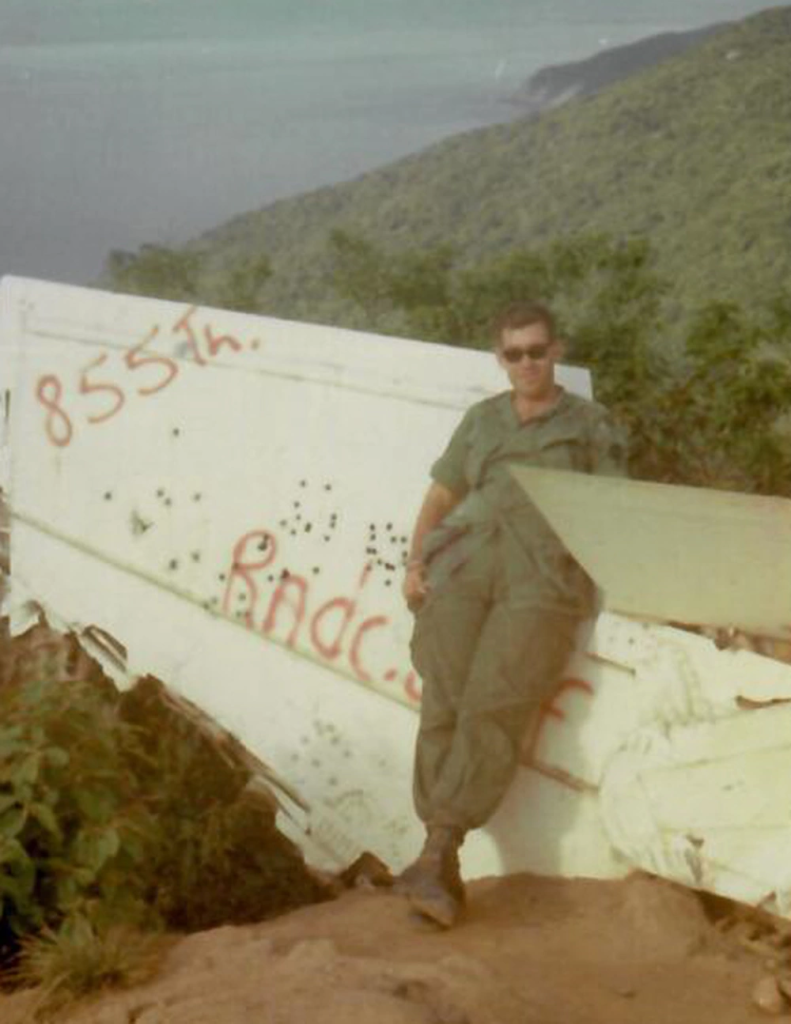PFC Raymond Charles Huot Jr. – U.S. Army
Headquarters Company, 3rd Ordnance Battalion, 1st Logistical Command Bien Hoa Province, Republic of Vietnam – November 7, 1970
November 7, 2025

 PFC Raymond Charles Huot Jr. – U.S. Army
PFC Raymond Charles Huot Jr. – U.S. Army
Headquarters Company, 3rd Ordnance Battalion, 1st Logistical Command
Bien Hoa Province, Republic of Vietnam – November 7, 1970
A Midwestern Boyhood
Raymond Charles Huot Jr. was born on March 31, 1952, in St. Paul Park, Minnesota—a small riverside community just southeast of the Twin Cities. It was the kind of town where everyone knew one another, where weekends meant church picnics, high-school football, and fishing on the Mississippi. In that post-war America, the Huot family raised their son to believe in hard work, faith, and country.
Those who knew Ray remember a quiet, polite young man, one of the youngest from his hometown to enter military service during the Vietnam War. In 1970, he was only eighteen—a teenager just out of school, with the same hopes and doubts as countless others his age. But instead of college or factory work, the war’s call reached even the small neighborhoods of Minnesota. Raymond answered that call with the earnest sense of duty that defined his generation.
Answering the Call
When he enlisted in the United States Army, Raymond became part of a massive logistical effort few civilians ever saw or understood. The Vietnam War was not only fought in the jungles—it was sustained by a sprawling support network that kept millions of rounds of ammunition, fuel, rations, and spare parts moving across the country.
By August 3, 1970, PFC Huot began his tour in Vietnam. He was assigned as a Clerk with Headquarters Company, 3rd Ordnance Battalion, 1st Logistical Command, stationed in Bien Hoa Province. The 1st Logistical Command—known throughout the Army simply as “1st Log Command”—was the lifeline of the American war machine. Its units built roads, maintained convoys, managed depots, and ensured that every combat soldier had what he needed to fight and survive.
Raymond’s position as a clerk might have seemed far from the front lines, but it was no less vital. Each day, he processed orders, recorded supplies, and supported the flow of material that kept divisions in the field moving forward. Behind every Marine in the jungle and every helicopter in the sky stood men like PFC Huot, who worked tirelessly under punishing heat and constant tension to make sure everything ran.
Bien Hoa: The Beating Heart of Logistics
Bien Hoa was one of South Vietnam’s busiest hubs. Located northeast of Saigon, it was home to a vast airbase, ordnance depots, and vehicle repair yards. Though technically “rear echelon,” the base was hardly safe. Enemy mortar and rocket attacks were a constant threat, and the psychological grind was unrelenting.
For young soldiers, days were filled with work details, long shifts, and the occasional letter from home—a precious lifeline that carried memories of a world that seemed impossibly distant. Nights were restless, with the dull hum of generators and the far-off rumble of artillery reminding them that the war was always near, even if unseen.
November 1970: The Letter
By the autumn of 1970, American morale in Vietnam was wearing thin. The promise of troop withdrawals under “Vietnamization” offered hope, but also uncertainty. For those left in country, time moved slowly, marked by the calendar on the wall and the mail that arrived—or didn’t.
On the evening of November 7, 1970, tragedy unfolded in silence. After reportedly receiving a “Dear John” letter from his girlfriend back home, PFC Huot climbed a water tower near his post at Bien Hoa. There, in the lonely hours of the night, he painted her initials high above the base—one final message that mixed love, heartbreak, and despair. Moments later, he fell to his death.
He was just eighteen years old.
The Army’s Report and the Unseen Battle
The Army classified Raymond Huot’s death as non-hostile, accidental—a cold bureaucratic phrase that offered little comfort to those who knew him. But behind those words lay the deeper truth of the Vietnam War’s hidden casualties.
Not all wounds bled, and not all losses came from enemy fire. For many young Americans overseas, the emotional weight of isolation, fear, and longing was unbearable. In a time when mental-health support was almost nonexistent, soldiers often faced their private battles alone.
PFC Huot’s final act speaks volumes about that loneliness. It reminds us that the Vietnam War’s toll extended beyond the firefights and ambushes—it reached into the hearts of those who carried the burden of separation, missing home and the life they left behind.
The Invisible Wounds
Historians now recognize that Vietnam marked a turning point in understanding combat stress and what would later be called PTSD. Yet in 1970, such struggles were rarely discussed. Soldiers were expected to stay strong, to “shake it off.” The pain that claimed Raymond Huot’s life was shared by thousands of others who endured silently.
Letters from home, once a source of comfort, could become triggers for overwhelming emotion. A breakup, bad news, or even simple distance could compound the crushing sense of isolation that already hung over the barracks. For a young man barely into adulthood, far from Minnesota, the emotional storm must have felt inescapable.
The Ripple Through St. Paul Park
When the telegram reached St. Paul Park, Minnesota, it shattered the Huot family’s world. In a town where nearly everyone knew everyone else, the news spread quickly. Neighbors brought food. Friends stopped by in silence, unsure what to say.
His parents faced the impossible: grieving a son lost not in battle but to the despair that war breeds in quiet corners. His name would eventually be etched into the Vietnam Veterans Memorial Wall in Washington, D.C., but the family’s pain was personal and enduring. They lost a son who had gone to serve, a boy who had barely begun to live.
The Meaning of His Service
It is tempting, when reading official records, to measure sacrifice only in combat deaths. Yet Raymond Charles Huot Jr.’s story broadens that understanding. His service as a clerk in the 3rd Ordnance Battalion was essential. Without soldiers like him, the front lines would have ground to a halt.
He served faithfully, did his duty, and bore the same weight of homesickness and danger that every man in Vietnam felt. His story reminds us that war does not end at the edge of the battlefield—it lives in the minds and hearts of those who keep the machine turning.
Every bolt loaded, every vehicle fueled, every ration delivered carried the fingerprints of soldiers like Raymond Huot. His contribution may not have been marked by medals or citations, but it was real, indispensable, and honorable.
A Name Among the Fallen
Today, PFC Raymond Charles Huot Jr.’s name is engraved on the black granite of the Vietnam Veterans Memorial—Panel 6W, Line 44. Visitors who pause before his name might never know his story, but the stillness of that moment honors him nonetheless.
The Wall does not distinguish between how one fell. Each name is equal, each sacrifice sacred. Whether killed by enemy fire, accident, or unseen pain, they are all part of the same brotherhood.
For every visitor who traces his name, a life once forgotten is remembered anew. That is why we tell his story—not to dwell on tragedy, but to affirm the humanity of every man who wore the uniform.
The 3rd Ordnance Battalion and 1st Logistical Command
The 3rd Ordnance Battalion operated under the 1st Logistical Command, headquartered in Long Binh and Bien Hoa. Its mission was to maintain and distribute ammunition, repair vehicles and weapons, and ensure that combat divisions received uninterrupted support.
The battalion’s personnel—clerks, drivers, mechanics, technicians—worked around the clock, often under rocket attack, to sustain the vast U.S. effort. Their camps buzzed with the sound of forklifts and engines, their paperwork stacks rivaling any battlefield’s complexity. It was an invisible war fought with ledgers, wrenches, and sweat instead of bullets.
For soldiers like PFC Huot, the pride of service was found not in glory but in contribution. Every successful convoy, every repaired tank, every resupplied outpost owed something to the unseen hands of the 1st Logistical Command.
Remembering the Unspoken Losses
At Ghosts of the Battlefield, we recognize that remembrance must include not only those lost in combat, but also those consumed by the unseen costs of war. PFC Raymond Huot’s story embodies the quiet tragedies that unfolded far from the gunfire—stories of heartbreak, isolation, and emotional struggle that history often overlooks.
In telling his story, we also honor the countless others who faced similar pain. Their battles were fought in silence, but their courage was no less real. The Vietnam War took a generation’s youth in many forms, and each life lost is a page of our shared history.
His Message, Written in the Sky
There is something hauntingly poetic in the image of a young soldier climbing a water tower to write the initials of the girl he loved. It was an act of longing—a message to the heavens, a farewell written in paint and sorrow.
That moment captures the human dimension of war better than any statistic. It shows the fragility of the human heart amid the machinery of conflict. Raymond Huot may have died far from home, but his final gesture speaks of love, heartbreak, and the universal yearning for connection that transcends time and place.
Closing Reflection
PFC Raymond Charles Huot Jr. was one of the youngest Americans to serve and die in Vietnam. His story challenges us to look beyond the traditional narratives of heroism and combat, to see the quiet endurance of those who bore the emotional cost of war.
He served his country faithfully, carried his duty with pride, and fell victim to the loneliness that haunted so many who served far from home. His death on November 7, 1970, is not simply a statistic—it is a testament to the unseen human toll that every conflict leaves behind.
At Ghosts of the Battlefield, we honor his memory and affirm that every life lost in service—whether to bullet or heartbreak—matters. His story will stand among those we preserve, ensuring that his name is not merely etched in stone, but remembered in spirit.
PFC Raymond Charles Huot Jr.
United States Army
Born March 31, 1952 – Died November 7, 1970
Bien Hoa Province, Republic of Vietnam
Panel 6W, Line 44 – Vietnam Veterans Memorial
“He served faithfully, but like too many, his heart broke under the weight of distance and duty.”
 PFC Raymond Charles Huot Jr. – U.S. Army
PFC Raymond Charles Huot Jr. – U.S. Army